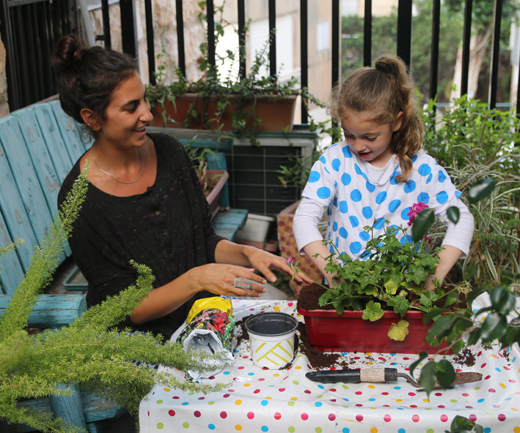
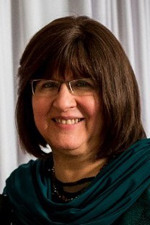
HAIFA, Israel — Every great project begins with one person’s dream, and his or her ability to inspire others.
Every parent wants the best for their children. We bring home a perfect child, swaddled in a soft blanket and love, and we think, someday, this child will move mountains or reach the stars.
The child develops at a perfect pace – responding to stimuli, eating, walking…each one in her due time, well behaved and bright. This is a perfect world.
This is also a fantasy.
There is a plethora of issues that we can encounter as parents, but we don’t always know where to find help, and with every new school year comes anticipation and apprehension.
These two realities – one man’s dream, and children’s needs – juxtaposed to create Arugot. “Arugot” is Hebrew for “flower beds” and in the last 30 years Arugot has planted seeds for the success of more than 4,000 children.
Dr Jeremiah Lubasch, founder of Arugot, is a pediatrician from Argentina, to which his parents had fled from Germany and the Nazis in 1939. He made aliya to Israel with his family in 1977 and they settled in Haifa, where he discovered, through his work, that there were problems that were going untreated, especially among the Haredi population, who were unwilling to send their children to secular pre-schools or therapy centers.
“One day, in 1989,” he says, “a new patient visited my clinic with her children. She had special education qualifications. I asked her if she wanted to work with me to establish a framework for Orthodox children with learning difficulties.” Mrs. Pnina Berkowitz agreed, and since then she has been the Pedagogic Director of Arugot. Today Arugot serves all children who need its services. It is a vibrant center that treats almost 400 children a year, most of them from families from the lower socio-economic strata, with a new center opened in 2018, in Afula. 77 % of preschool graduates continue to regular classes. Ruth Kaniel, director of Resource Development and Public Relations, says, “The dynamic nature of Arugot allows for projects to be established as the needs in the community change, and treatments are culturally sensitive to the target populations.”
The challenge, the focus and the methods
Arugot’s focus is on children with learning disabilities
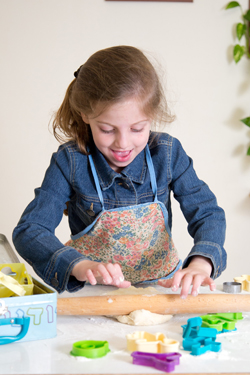
, developmental delays and emotional problems. Children with ADD/ADHD or with learning disabilities can be among the most creative, funny and colorful children, but they need a combination of support and understanding from the home and special help or therapies from top notch professionals, who genuinely love their students, because love will always be the magic ingredient. To this end, the Arugot therapists give guidance to parents and closely involve them in the child’s therapy.
Arugot offers a range of paramedical therapies (speech and occupational) and emotional therapies (music, art, drama, animal assisted, sand tray and therapeutic kitchen). It also offers Dyad Therapy (in which parents or siblings are treated together with the child), CBT coaching and DBT, by a clinical social worker with a specialization in the area of abuse, for women and adolescent girls.
One of the most beloved therapies is psychodrama. Chaya Handelsman, MA, an Arugot psychodrama therapist, explains that pretending to be “someone else” is a non-threatening way to express feelings and thoughts, bringing to the fore the inner world of the child. Movement, writing, music, guided imagery and art are also used by the therapist. These actions reveal the inner worlds of the children, is empowering to them and enhance emotional well-being.
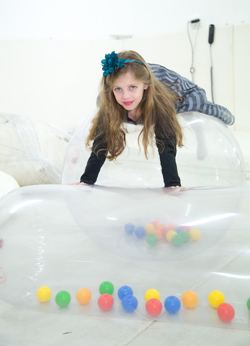
Ground-breaking Snoezelen Room
Arugot is also, according to its directors, one of the first centers in Israel to employ a ground-breaking invention, the concept of which was imported from Holland, called a Snoezelen Room, in which a multi-sensory environment is created that is conducive to opening up emotionally and feeling calm. The entire room is calming white, padded with soft furnishings and mattresses. As an expression of Arugot’s outreach to the community, the Snoezelen room also helps to provide therapy to abused wives, and following the Second Lebanon War, in 2006, it served children and adults suffering from PTSD.
Bridging Many Cultures
The Arugot team recognized that in order to achieve maximum impact, they needed to reach out to all sectors in the community and to create partnerships.
From 2004-7 Arugot established an after-school program for female Russian pupils, including hot meals, homework help and activities. It ceased when the Russian student population was successfully integrated into the Israeli population.
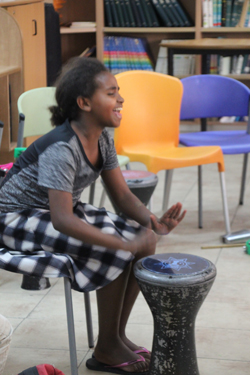
Some would like to say that the Ethiopians are already integrated and have been in Israel long enough – and that the aliya has been completed from Ethiopia. But one school recently received nine new pupils off the plane from Addis Ababa.
Research shows that the Ethiopian community lags behind the Israelis in numbers that complete matriculation exams and go on to higher education. Many of the adults are in menial jobs and can’t help their children with homework. Arugot sent a remedial teacher to a school in Haifa to tutor Ethiopian pupils, and emotional therapists to address the children’s trauma and help with social skills. They were then integrated with Israelis and Arugot was sent to four more schools, but each year it depends on the funding. Kaniel says, “Principals are clamoring to join the program and school counselors are begging for more hours.” The original program was with the help of the Sobell Foundation and the Pacey Foundation, both located in England, and today funded by Help Jews Home, Norway. Graduating with honors, these nine pupils received certificates of excellence.
Partnering for greatest impact
Success demands opening up one’s heart and one’s doors. Arugot works in partnership with Haifa University, with Rambam Hospital, with Oranim College, with several Bais Yaakov teacher training seminaries, and is funded by the ministries of Education, Economy and Industry, Labor, Social Services, and Justice; it also works with the Haifa municipality, with all the health funds and with Bituach Leumi.
When Dr. Lubasch was approached to set up a program for severely handicapped toddlers aged three months to three years, he realized that this was not in their expertise, so he approached Elwyn Israel, and he was instrumental in establishing a class for religious children.
Arugot works with a shelter for battered women in Haifa called “Women to Women.” The project is to provide professional assessments to children; followed by didactic reinforcement and emotional therapies to mothers.
The children in the shelters are hidden victims who have had to flee their homes. Their behavior can be very problematic – bed wetting, hoarding, violence, lack of boundaries. The mothers aren’t always available to give children the time and attention they need, as they themselves are in a state of flux and distress. The assessment provided by Arugot helps ascertain if the children are suffering from learning disabilities or if their behavior is a result of their situation. The enables teachers and counselors to understand them and carry on the work.
In 2019 Arugot sent a therapist who is a Haredi woman from a Hassidic background to one of these shelters. Many of the women with whom she worked were Arabs. The shelter asked her to continue, as the women loved her. Kaniel says, “The merging of cultures here is very dynamic and exciting.”
The Arugot website (www.arugot.org) reaches beyond the borders of Haifa, Afula and Israel. It includes valuable tips and strategies for both teachers and parents of ADD/ADHD pupils.
A taste of successes and future plans
During the last month of the school year, 20 art exhibitions took place in the Art Therapy department.
Rivka from Ethiopia, in the 6th grade, less than a year in the country, performed in the end of the school year play, in fluent Hebrew. She was advised by the authorities to continue to a junior high school for olim, but she chose a regular Israeli school together with her new friends.
A child, who was considered autistic, greatly improved after his hearing problems were addressed, and he
received multiple therapies in Arugot.
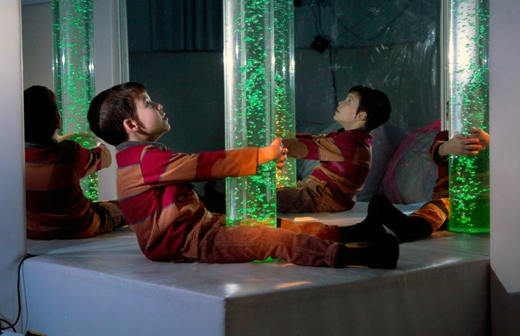
Sensory diet uses a range of interventions to enhance sensory integration. In one preschool, children start off the day imitating animals: crawling like cats, sliding like snakes, jumping like frogs and walking on all fours face up like spiders – all this contributes to their sense of self, helps them organize their bodies and calms them down.
Throughout the year, children follow the progress of their plants – planting, watering, nurturing and watching them flower and blossom, giving children a sense of achievement.
At the new branch in Afula, mothers learned about “The Importance of Playing with One’s Children,” from a lecture by a senior Arugot therapist on the importance of imaginative play and cognitive games, followed by interactive workshops with music and art therapists.
Plans for the future include increasing the volume of treatments, a therapeutic garden on the roof for Horticultural Therapy, expanding the project: “Jumpstarting Children in Regular Preschools,” renovating and improving the main building of the Learning and Therapy Center, and expanding the scope of therapies in the Afula branch to include paramedical therapies. Sponsorship of the needs of individual children can be through the “Adopt a Child” program, or sponsorships of specific areas of therapy.
Where are they today?
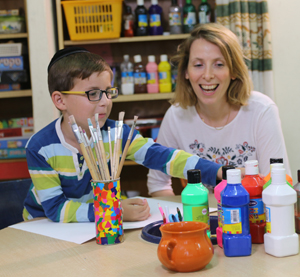
Arugot has been treating children for 30 years. They catch them when they are young, when treatment is most effective, and the goal is that many of the various therapies will no longer be necessary.
Those children are now in regular elementary and high schools and colleges throughout the country, and in the army, or doing national service.
Here is a sampling of where some of the adult Arugot graduates are today:
Tali graduated at the top of her class in accounting and opened her own accounting firm.
Shimi is the CEO of a supermarket.
Sara is a popular designer of women’s head fashion
Ofira is the senior manager of a cosmetics shop.
Stories (Names have been changed)
Dudu is a bright child who always comes to the center hungry, in more ways than one. He lives with his divorced father and his home life is irregular. He is behind in his schoolwork and he gets up late. At Arugot he receives remedial didactic tutoring in reading, comprehension and math. An emotional therapist is helping him to overcome his confusion, distress, and lack of stability. A social worker has made progress in meetings with his father. At Arugot, he receives warmth and is respected and loved.
David, a seven-year-old with ADHD, twice suffered from car accidents after riding his bicycle into traffic, one resulting in a head injury. For a year he received didactic remedial help at Arugot. When his teacher told him that he has improved sufficiently and next year would not be coming, he said, “No way. I’m staying here till I get married, and you see this chair? My bride will sit here.”
Yonat, a girl of six, came to Arugot for occupational therapy. At home, she would suck her pacifier all the time and had other problems. Yonat’s parents lacked basic awareness about child development and sensory motor integration. She was never exposed to play dough, paints or glue, and they didn’t take her outside for nature and outdoor activities.
Orit, Arugot’s expert in sensory motor development, worked with her an hour a week, and met monthly with her parents, guiding them in how to stimulate and develop her language. They introduced books, toys and outside activities. Yonat began to enjoy sensory experiences, such as stroking animals and creating works of art –painting, drawing and sculpting with clay. She slowly weaned herself off her pacifier, attached it to a helium balloon and sent it up into the sky, gone forever.
Rina is a teenager who has difficulty accepting authority and keeping rules. A dog named Mika is present during her pet therapy sessions. While Rina chats with her therapist, Shalom, Mika waits patiently for Rina to give him the treat which is lying on the floor near him. Rina internalized that Mika is prepared to wait because he knows he is loved, and at her next meeting with Shalom, she was proud to share that keeping rules is becoming easier for her.
Shlomit is a child who came for OT two months before the end of the school year, because her pencil grip was in the wrong direction; she held it backwards and had no control over it. Yet, she was a clever child who acquired reading and basic numeracy at a young age. Orit discovered that Shlomit had organizational problems. After she taught her how to organize her personal belongings and her school supplies, she learned how to write.
Asoubalo, born in Israel, is seven-years-old and in first grade. When his parents came on aliya, his father was 80 years old, and his mother 22. In Ethiopia, polygamy is allowed. His father left behind two wives with their children. Asoubalo’s mother supports the family through menial work. Asoubalo is confused and frustrated by the culture differences between his home and that of his Israeli friends. He gets into fights with friends who tease him about his father. Emotional Therapy in a group setting helps Asoubalo improve his self-confidence and make friends in a non-threatening environment.
Eitan, a boy of 12, lost his father in a tragic car accident when he was only six years old. Gail, a Snoezelen Room and movement therapist, says, “For years, he didn’t process his loss or express his grief. When he started to wet his bed, his mother, who had in the meantime remarried, brought him to Arugot with tears in her eyes, seeking help.” Gail stepped in with love, warmth and understanding, meeting with Eitan once a week. “At first, Eitan was withdrawn and would keep himself occupied quietly with various pieces of equipment. One day he noticed a white board with a laser pen, in the Snoezelen room. He wrote his name, Eitan, which slowly faded and disappeared.” Gail wrote her name; it too disappeared. Then he wrote the words ABBA (father in Hebrew) and his father’s name. All the words disappeared. This triggered a process of healing. A few months later, his mother accompanied him to Arugot to say, “I have a new son!” and she shed tears of joy.
Overcoming family tragedy. Following a tragic car accident and the loss of their father, the children of the A. family come to Arugot for group therapy using a model called “Siblings Therapy,” facilitated by a psychodrama therapist and an occupational therapist. The goal is to help them integrate the tragedy and gain coping skills. The children are able to express themselves non-verbally using a range of art materials and towards the end of each session they share their feelings. All of a sudden, said the mother, her children were confronted with emotions such as the pain of loss, anger, confusion, and frustration. In therapy, they are learning to be open about feelings, and expressing them is part of the healing process.
Awards and Landmarks
In April 2001 Arugot was awarded the prestigious William Trump Recognition Award for over a decade of “outstanding commitment to children with developmental disabilities.”
In December 2008, Arugot’s reading expert received a prize for “Excellence in Education” from the Israel Teachers’ Union. This method, called “Musima” developed at Arugot, uses musical notes as cues to help dyslexic pupils learn to read.
The Midot Seal of Effectiveness was granted to Arugot in 2017.
For more information: Arugot, info@arugot.org, www.arugot.org
*
Toby Klein Greenwald is a journalist, playwright, poet, teacher, and the artistic director of a number of theater companies. She is the recent recipient of the Lifetime Achievement award from Atara-The Association for Torah and the Arts for her “dedication and contributions in creative education, journalism, theatre and the performing arts worldwide.”